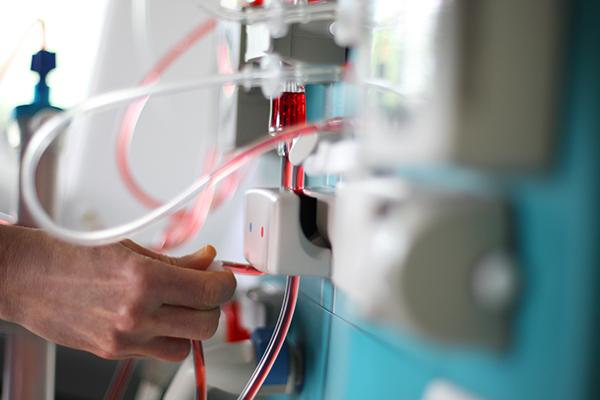Study Shows Investigational Solution Reduces Catheter-Related Infections

Investigators present findings at the National Kidney Foundation’s 2019 Spring Clinical Meetings
New York, NY – May 10, 2019 - Results of the LOCK-IT-100 study presented this week at the National Kidney Foundation’s 2019 Spring Clinical Meetings in Boston provide evidence of safety and efficacy for an investigational catheter lock solution that is designed to reduce life-threatening catheter-related bloodstream in patients on dialysis.
Catheter-related infections in hemodialysis remain a significant healthcare issue despite improvements in hand hygiene and catheter care, according to the investigators. Central venous catheters in hemodialysis account for 69 percent of access-related bloodstream infections in hemodialysis although those comprise only 19 percent of prevalent vascular accesses.
“As a practicing nephrologist, I see hemodialysis patients in the clinic every day who are at risk for central venous catheter infections and its complications which can sometimes be fatal,” said investigator Dr. Anil Agarwal of The Ohio State University College of Medicine in Columbus.
The study titled “A Phase III, Prospective, Multicenter, Double-Blind, Randomized, Active Control Study to Demonstrate the Safety and effectiveness of Neutrolin in Preventing Catheter-Related Bloodstream Infections in Subjects Receiving Hemodialysis Therapy as Treatment for End Stage Renal Desease” was presented during the NKF annual conference that draws thousands of kidney health professionals. The solution is used in the catheter to reduce the case of infection.
“The LOCK-IT-100 study impressed me that if Neutrolinâ, the investigational catheter-lock solution, is approved, I will have a new agent with a good safety profile that can help cut the risk of catheter-related bloodstream infections in my patients,” Dr. Agarwal said.
Neutrolinâ, is being developed by CorMedix Inc. The company is working with the U.S. Food and Drug Administration to obtain approval for commercial distribution in the US, according to Dr. Agarwal.
In Boston, thousands of professionals in nephrology gathered to share the latest information, treatment and studies of CKD. Teams presented hundreds of studies during the “poster presentations.”
NKF Spring Clinical Meetings
For the past 27 years, nephrology healthcare professionals from across the country have come to NKF’s Spring Clinical Meetings to learn about the newest developments related to all aspects of nephrology practice; network with colleagues; and present their research findings. The NKF Spring Clinical Meetings are designed for meaningful change in the multidisciplinary healthcare teams’ skills, performance, and patient health outcomes. It is the only conference of its kind that focuses on translating science into practice for the entire healthcare team. This year’s Spring Clinical Meetings will be held May 8-12 in Boston, MA.
NKF Professional Membership
Healthcare professionals can join NKF to receive access to tools and resources for both patients and professionals, discounts on professional education, and access to a network of thousands of individuals who treat patients with kidney disease.
Kidney Disease Facts
In the United States, 30 million adults are estimated to have chronic kidney disease—and most aren’t aware of it. 1 in 3 American adults are at risk for chronic kidney disease. Risk factors for kidney disease include diabetes, high blood pressure, heart disease, obesity and family history. People of African American, Hispanic, Native American, Asian or Pacific Islander descent are at increased risk for developing the disease. African Americans are 3 times more likely than Whites, and Hispanics are nearly 1.5 times more likely than non-Hispanics to develop end stage renal disease (kidney failure).
The National Kidney Foundation (NKF) is the largest, most comprehensive, and longstanding patient-centric organization dedicated to the awareness, prevention, and treatment of kidney disease in the U.S. For more information about NKF, visit www.kidney.org.
